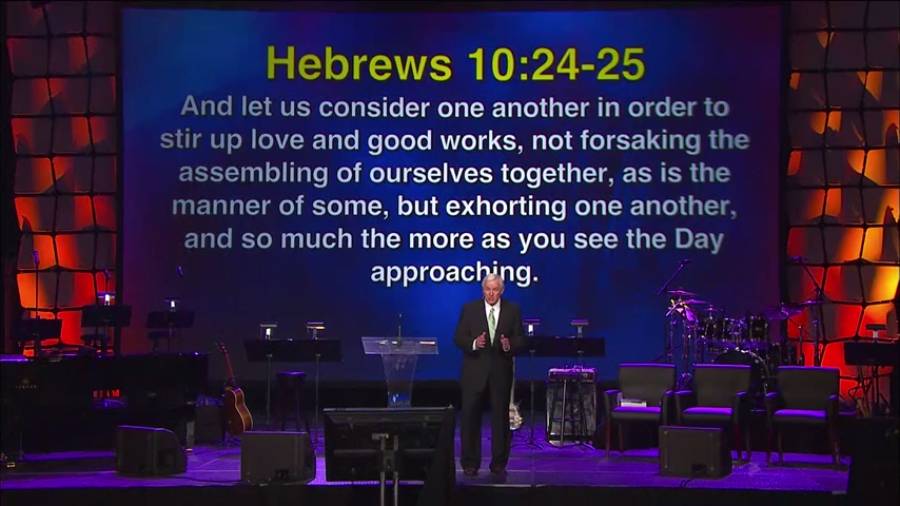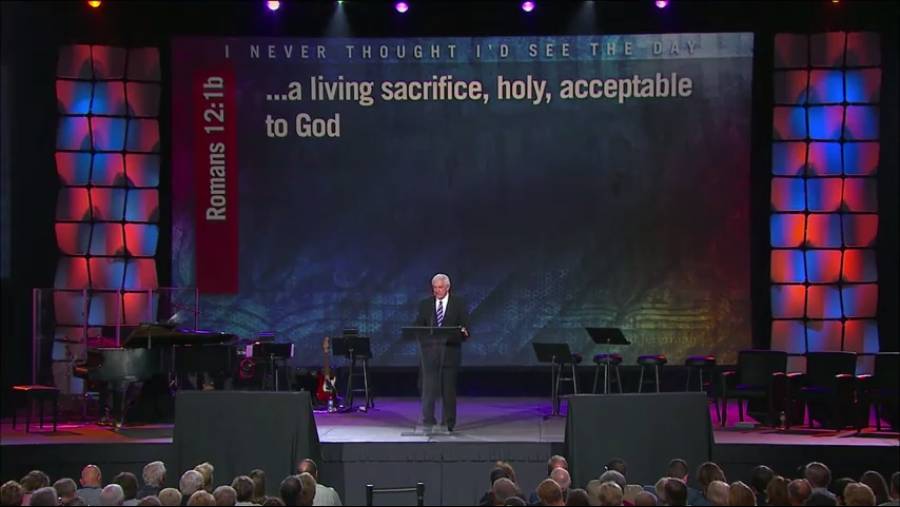

Dr. David Jeremiah Presents
Living inthe Ageof Signs
Online Destination

Living in the Age of Signs
Online Destination
THE BOOK OF REVELATION
Promised Blessings
Revelation is the only book in the Bible that motivates its readers by promising a blessing to those who read and obey it—and a curse to those who tamper with it: "I warn everyone who hears the words of the prophecy of this scroll: If anyone adds anything to them, God will add to that person the plagues described in this scroll. And if anyone takes words away from this scroll of prophecy, God will take away from that person any share in the tree of life and in the Holy City, which are described in this scroll" (22:18–19, NIV).
That is a sobering thought. It should be considered by all those who do not believe in the inerrancy of the Bible or the accuracy of prophecy. Personally, I like positive motivation better, and Revelation has that. There are seven blessings in the book:
"Blessed is the one who reads aloud the words of this prophecy, and blessed are those who hear it and take to heart what is written in it, because the time is near" (1:3).
"Then I heard a voice from heaven say, 'Write this: Blessed are the dead who die in the Lord from now on.' 'Yes,' says the Spirit, 'they will rest from their labor, for their deeds will follow them' " (14:13).
"Look, I come like a thief! Blessed is the one who stays awake and remains clothed, so as not to go naked and be shamefully exposed" (16:15).
"Then the angel said to me, 'Write this: Blessed are those who are invited to the wedding supper of the Lamb!' And he added, 'These are the true words of God' " (19:9).
"Blessed and holy are those who share in the first resurrection. The second death has no power over them, but they will be priests of God and of Christ and will reign with Him for a thousand years" (20:6).
"Look, I am coming soon! Blessed is the one who keeps the words of the prophecy written in this scroll" (22:7).
"Blessed are those who wash their robes, that they may have the right to the tree of life and may go through the gates into the city" (22:14).
The Majesty of Jesus
Nothing reveals the majesty of this book as does John's reaction to the personal revelation of Jesus. When he saw Him, he fell at His feet in a dead faint. I don't know if anyone ever fainted while bowing to the King and Queen of England, or some other monarch—it's possible. John was so overcome he simply fainted.
Jesus must have smiled as He looked at His beloved disciple. He tenderly put His hand on him and told him not to be afraid.
The Jesus of Revelation is not the humble carpenter or the teacher with worn sandals. He is "His Majesty King Jesus"! He doesn't say that He will be King, but that He is the ruler of the kings, the King of kings.
He is King of heaven—(Daniel 4:37).
He is King of the Jews—(Matthew 2:2).
He is King of Israel—(John 1:49).
He is King eternal—(1 Timothy 1:17).
He is King of glory—(Psalm 24:7).
He is King of the nations—(Revelation 15:3).
He is King of kings—(Revelation 19:16).
If I didn't know that He was in charge, I would be frightened. As the bizarre murder stories, the accelerating global contamination, the collapsing of personal and moral values blare at us each day, I remind myself of the King.
Today we are concerned about who's in charge of the nations of the world. We believe if the right person is elected, or the wrong one ousted, the world will be better. Granted, these are worthwhile bandages for a wounded globe, but not the cure. The second chapter of Daniel tells us that human governments will topple.
Bernard Eiler said, " 'the kings of the earth' are where the action is, theirs is the clout that makes things happen; theirs are the actions determining the course of history.... Contrary to their own inflated opinion, that crew does not hold the reins of history. John's very first notice of the kings of the earth is to proclaim that they have a ruler; they are being ruled."1
Some may think God is powerless and evil rulers guide the destiny of this planet. Things are not what they seem! Jesus is Lord.
Christ's Return
Revelation presents the King who is coming again, at a time when "every eye will see Him" (1:7). The word most often used to describe the second coming of Christ is parousia. This is the Greek term for a coming event which immediately changes the situation.
I'm sure schoolchildren today never throw erasers or spitballs when the teacher leaves the room, but they did when I was in school. When the teacher left the room, a wild eraser fight would erupt. The chalky missiles would spread dust all over the room until she returned. Her entrance would be a parousia. Little hands holding erasers would stop in mid–air and every student would be an instant model of pious behavior.
Christ's return will change the situation on earth. He will "return in the clouds," a familiar description of His appearing. When Moses was given the law on Mount Sinai, a thick cloud surrounded the mountain. When the tabernacle was set up in the wilderness, a cloud covered the tent of the congregation. At the transfiguration of Jesus, He and the disciples were overshadowed by a bright cloud. When He ascended to heaven a cloud received Him, and Daniel predicted that the Messiah would come with the "clouds of heaven."2
On days when the cumulus clouds form in blue skies, I like to imagine that Jesus will appear and all over the earth unbelieving persons will stare with amazement and shock to see Him descend to earth.
The aim of Revelation is not only to present to us the coming King, but also to tell us the purpose of His kingdom. In America we hear the politicians tell us every four years why we should elect them and what their programs will be if they win office. Revelation is the account of Jesus' campaign for the rulership of the earth. We are clearly told of His relationship to the church, His appointment by the Father to the throne, His crusade against the satanic forces of evil, and His final victory. There is no need to count votes, for He knows the results.
This article is taken from David Jeremiah's book, Escape the Coming Night.
1Bernard Eiler, The Most Revealing Book of the Bible—Making Sense out of Revelation (Grand Rapids: Eerdmans, 1974), 48.
2See Matthew 24:30; Exodus 19:9; 30:34; Matthew 17:5; Acts 1:9; Daniel 7:13.

The Four Loves: Agape—Our Love for God
Today’s Audio Devotion:
The Four Loves: Agape—Our Love for God
The New Testament was originally penned in Greek, and there are four different Greek words translated love. The word agape represents the essence of divine love—God’s own special love. It’s the love God has for us and the kind of love He gives us for Himself and others.
Osborne Gordon, a nineteenth-century British pastor, said, “There is no soul so pure and heavenly that it can throw back upon God all that love which He lavishes upon us. God loves us infinitely more than it is possible for us to love Him; but whatever feeble flame of love is kindled in our hearts and goes up as a sacrifice to Him, we are only giving Him of His own.”
That’s a good description of agape. The greatest command within Scripture is to love the Lord our God with all our heart, mind, and soul (Matthew 22:37). It’s the Lord Himself who gives us the agape that allows us to do that. Let His love set your heart on fire, and return it like sparks flying upward to Him.
Our love of [God] is nothing more than His love to us, reflected back upon Him, the source of love.
Osborne Gordon
For Your Phone or Tablet
Official Mobile App and Lock Screens
What were you doing at age 19? Jonathan Edwards is considered to be America's greatest theologian, and during his nineteenth year (1722–1723) he composed a list of resolutions to guide his life. They weren't legalistic rules—he wrote that he could only accomplish them by God's grace. But as a Puritan Christian, he knew he was prone to wander. He wanted his resolutions to be a track that would guide his life.
During that year Edwards wrote 70 resolutions, including the following (which I have summarized or paraphrased):1
No. 1: Resolved . . . to do everything for God's glory and man's good.
No. 13: Resolved . . . to continually look for suitable objects of charity and generosity.
No. 40: Resolved . . . to inquire every night whether I did the best I could during the day with regard to eating and drinking.
No. 55: Resolved . . . to act at all times as if I had already seen the glories of heaven and torments of hell.
His goal was to read all 70 resolutions at least once each week. Many famous people who had great impact on our world crafted and followed a vision statement. They were putting into words the mission of their lives. Or, to use contemporary language, it doesn't fit within their mission statement. Mission statements keep the “good” from getting in the way of the “best.”
Shouldn't we, as Christians, be able to verbalize our spiritual mission in life? Shouldn't we also ask ourselves, “What spiritual business am I in?” and “How's business?” I definitely think we should.
But you can't answer the second of those questions without knowing the answer to the first. And you can't know the answer to the first without knowing your personal spiritual mission in life.
Is there biblical precedent for this? I believe there is.
Moses' mission statement was given to him by God: “Go to Egypt and bring up the children of Israel to the land of Canaan that I have given them as a homeland forever” (paraphrase of Exodus 3:16–17).
Solomon's mission statement was given to him by his father, David: “Follow the commands of God, possess the land, and build a temple for God in Jerusalem” (paraphrase of 1 Chronicles 28:8–12).
John the Baptist's mission statement was given to John's father by the angel Gabriel: “John will be set aside unto the Lord. He will call many Jews back to the Lord. He will go before the Lord in the spirit of Elijah to make the people of Israel ready to receive their Lord” (paraphrased from Luke 1:14–17).
Jesus Christ: “For even the Son of Man did not come to be served, but to serve, and to give His life a ransom for many” (Mark 10:45).
The apostle Paul's mission statement came from Christ: “I am sending you to the Gentiles to open their eyes, to turn them from darkness to light, from the power of Satan to God, that they may receive forgiveness of sins and an inheritance among those who are sanctified by faith in Me” (paraphrase of Acts 26:17–18).
What I like about each of these statements is their specificity. Each one is unique. That's what we're talking about—a personal mission statement. Here's another way to think about it: The Great Commission of Christ is a corporate mission statement given to the Church as a whole (Matthew 28:19–20). The Church's mission is to make disciples in all nations. But what is your part in that mission? What is your personal mission statement? What has God equipped and called you to do as part of the Body of Christ to help the Church fulfill the Great Commission?
Writing Your Mission Statement of Faith
What is a mission statement of faith? For me, it might read, “Faithfully using my God–given gifts and abilities, my mission is to expand and build up the Church of Jesus Christ by teaching the Bible as the pastor of Shadow Mountain Community Church and the lead teacher of Turning Point ministry.” It is so specific that it could only be mine. It clearly reflects what I believe God has called me to do. My mission as a husband and father and grandfather is understood, of course, but that mission applies to every Christian man who is married with a family.
I encourage you to write a personal mission statement of faith for yourself. To prime the pump, here are five steps to guide you (courtesy of career development expert Dr. Randall S. Hansen):3
Identify past successes. How has God used you in the past? What have you most enjoyed doing in the past? Where do others think you've been fruitful?
Identify core values. Brainstorm the values and beliefs that most define who you are. Yes, Christians should share common core beliefs. But, based on who you are, you will be more passionate about some than others.
Identify contributions. What are you equipped to do? What skills, resources, talents, and passions do you possess?
Identify goals. If you could do anything for the cause of Christ in this world, what would you do? If resources were not an issue, what would you do in three months? Three years? Three decades?
Write your mission statement. Important: Don't make your mission statement a description of your current life unless you have worked through this process before and you know that you are presently doing exactly what God has called and equipped you to do. Even in that case, creating a personal mission statement of faith can be a clarifying and confirming exercise. Instead, this exercise is about taking a fresh look—perhaps for the first time—at who you are. It means recognizing that no Christian in the world is like you. It means discovering the “good works” that God saved you to walk in by grace (Ephesians 2:8–10). It means believing that your days were written in God's Book before you were born (Psalm 139:16).
Jewish therapist and Holocaust survivor Dr. Victor Frankl said, “We detect, rather than invent, our missions in life.” That observation certainly applies to Christians, since it recognizes that God has a mission for us. God has a plan, a job, a calling for us to fulfill. The more intimately we walk with Christ, and the longer, the better sense we should develop about our personal mission for Christ. We don't need to invent it—we need to discover it.
Work through the five steps outlined above and share the results with close friends and get their feedback. Pray and ask God for His wisdom. Take time to work through developing your mission statement of faith. And then, most importantly, begin merging your life with your mission. A mission statement is not to hang on the wall or stick in your Bible. It is a benchmark you use to evaluate your life over time.
Today is the day to begin fulfilling our mission for God.
1A helpful list of Edwards' Resolutions can be found at http://www.desiringgod.org/resourcelibrary/articles/the–resolutions–of–jonathan–edwards, accessed 3/16/12.
2http://www.franklincovey.com/msb/inspired/anonymous, accessed 2/16/12.
3http://www.quintcareers.com/creating_personal_mission_statements.html, accessed 2/16/12.















